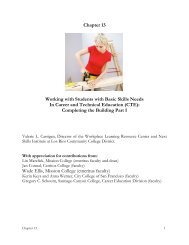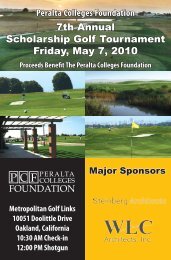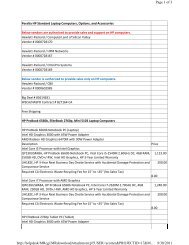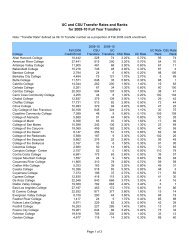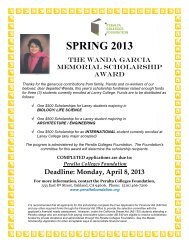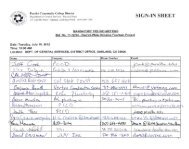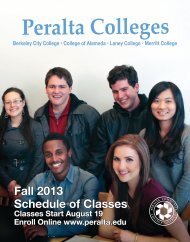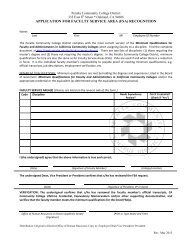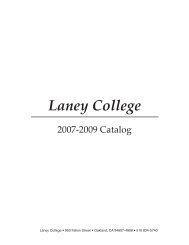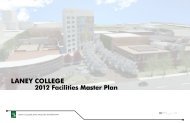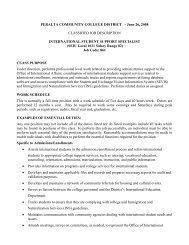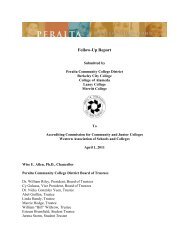222 district policies and proceduresTitle 5 RegulationsIt is the policy of the <strong>Peralta</strong> Community College District(unless specifically exempt by statute) that every course,wherever offered and maintained by the district, for whichthe average daily attendance is to be reported for state aid,shall be fully open to enrollment and participation by anyperson who has been admitted to the college(s) and whomeets such prerequisites as may be established pursuantto Chapter <strong>11</strong>, Division 2, Part VI, Title 5 of the CaliforniaAdministrative Code, commencing with Section 51820.Weapons PolicyThe unauthorized use, possession or storage of weapons,fireworks or explosives is prohibited on any <strong>Peralta</strong>college premise (including vehicles) or at any <strong>Peralta</strong>college sponsored activity. Weapons may include, butare not limited to firearms, pellet guns, bows and arrows,martial arts equipment, switchblade knives, swords, largeknives, and clubs.Smoking PolicyIn order to provide a safe learning and workingenvironment for students and employees, smoking isprohibited in all indoor and outdoor campus locationswith the exception of designated areas as identified by thecolleges and approved by the Board of Trustees.Academic Integrity/Academic Honesty for StudentsThe <strong>Peralta</strong> Community College District and College ofAlameda have the responsibility to make every reasonableeffort to foster honest and academic conduct. Academicdishonesty defrauds all those who depend upon theintegrity of the colleges, its courses, and its degrees andcertificates. Academic dishonesty occurs when a studentattempts to show possession of a level of knowledge, skill,or accomplishment which he or she does not possess. Itis the student’s responsibility to know what constitutesacademic dishonesty. If a student is unclear about aspecific situation, he/she should speak to the instructorof record.Nothing in this policy shall be interpreted to discouragecollaborative learning or other cooperative methods oflearning.The following list includes, but is not limited to, some ofthe activities which exemplify academic dishonesty:1. Cheating:a. Copying, in part or in whole, from someone else’stest.b. Communicating answers to another studentduring an examination.c. Taking an examination for another student orhaving someone take an examination for oneself.d. Altering or interfering with grading.e. Using or consulting any sources or materialsnot authorized by the professor during anexamination, including calculators, dictionaries,or any electronic devices, including texting toobtain information.f. Misreporting or altering the data in laboratory orresearch projects.g. Committing other acts which defraud or misrepresentone’s own academic work.2. Plagiarism:a. Incorporating the ideas, words, sentences,paragraphs, or other parts of another person’swriting, without giving appropriate credit, andrepresenting the product as one’s own work.b. Representing another’s artistic/scholarly works(such as musical compositions, computerprograms, photographs, paintings, drawings, orsculptures) as one’s own.c. Submitting a paper purchased or downloadedfrom a research or term paper service.d. Using the content of thought in outside sources(books, periodicals, the Internet, or otherelectronic sources, or other written or spokensources) without giving proper credit (by namingthe person and putting any exact words used inquotation marks).e. Writing or creating a speech, essay, report, projector paper for another student.3. Other Specific Examples of Academic Dishonesty:a. Purposely allowing another student to copy fromone’s paper during a test.b. Giving one’s homework, term paper, or otheracademic work to another student to plagiarize.c. Having another person submit any work in one’sname.d. Lying to an instructor or college official to improveone’s grade.e. Altering graded work after it has been returned,then submitting the work for regrading withoutthe instructor’s permission.f. Removing tests or examinations from the classroomwithout the approval of the instructor.g. Stealing tests or examinations.h. Having one’s work corrected for spelling orgrammar, if contrary to the rules of the course.i. Forging signatures on drop/add slips or alteringother college documents.j. Facilitating any of the above on behalf of otherstudents.Faculty members are encouraged to review this policywith their students.4. Consequences of Academic Dishonesty:Please refer to Policy and Procedures for “StudentConduct, Discipline, and due Process Rights,” in thissection.
Faculty/Stafffaculty/staff223Abadia, ClaudiaMathematicsBA Biology, U.C. Santa CruzMS Applied Mathematics, C.S.U. HaywardAlbright, ScottDiesel MechanicsAA, Chabot CollegeAli, SamiElectronics TechnicianAnderson, SherryFinancial Aid SpecialistAA, College of AlamedaAndrews, Cynthia R.Children’s Center SpecialistBA, Children’s Center Site Supervisor Permit, CaliforniaCommission on Teacher CredentialingAndrews, William R.Auto Body & PaintVoc. Ed. Credential, UC BerkeleyArmstead, PaulaEOPS SpecialistBA, San Jose State UniversityArmstrong, ShirleyAdmissions & RecordsAA, College of AlamedaArndt-Greenspan, Mary K.Secretary, Business & TransportationAA, College of AlamedaAshford, EdCustodianBaker DeidreMathematicsBA, CSU SacramentoMA, UC BerkeleyBajrami, DianaEconomicsMA, MSW, CSU SacramentoBanks, Debra L.Research & Planning OfficerBA, MA, University of HartfordPhD, UCLAAEA Certificate: Effect Size and non-parametric statistics,Rasch measurementNIH Certificate: Evaluator, Research Design on GenericDrugsCEDA Certificate: Student Outcomes, Designing FacultyEvaluationsBarksdale, WillardDept. Network CoordinatorAA, College of AlamedaBA, American InterContinental UniversityBarnett, Janet V.Staff Assistant, Admin. ServicesBarnett, Patricia A.Library TechnicianBeltran, BarbaraSr. Clerical Assistant, Arts & LettersBenecke, GaryAviation Maintenance TechnologyAA, Diablo Valley CollegeAS, BS, Cogswell CollegeA&P CertificateBias, Brenda J.CounselorBA, Pasadena CollegeMS, Univ. of Southern CaliforniaBledsoe, JaniceSr. Clerical Assistant, Student ServicesAS, College of AlamedaBrem, Robert J.Political Science, Public Administration, Psychology/CounselingAA Scottsdale Community CollegeBS, MA, MC Arizona State UniversityNCC, National Board for Certified CounselorsCertificate, ASU Nonprofit Management InstituteBryant, MarceanAdmissions & Records SpecialistByrne, John M., Jr.Toolroom Keeper I, Auto Body & Paint
- Page 3 and 4:
2009-2011 CATALOG555 Ralph Appezzat
- Page 6 and 7:
College of Alameda AdministrationOf
- Page 8 and 9:
telephone numbersTelephone NumbersC
- Page 10 and 11:
ACADEMIC CALENDARFall Semester 2009
- Page 12 and 13:
10WELCOME!Who we are, what we do,an
- Page 14 and 15:
12WELCOME TO COLLEGE OF ALAMEDA•
- Page 16 and 17:
14GENERAL INFORMATIONCampus........
- Page 19 and 20:
GENERAL INFORMATION17Accuracy State
- Page 21 and 22:
College InformationCollege INFORMAT
- Page 23 and 24:
College INFORMATION21Returned check
- Page 25 and 26:
College INFORMATION23matriculation
- Page 27 and 28:
College INFORMATION25Exención del
- Page 29 and 30:
College INFORMATION27
- Page 31 and 32:
College INFORMATION29College HourTh
- Page 33 and 34:
STUDENT FINANCIAL AID31General Stat
- Page 35 and 36:
student financial aid33Financial Ai
- Page 37:
35• A student may repeat a course
- Page 41 and 42:
services FOR STUDENTS39Intercollegi
- Page 43 and 44:
services FOR STUDENTS41ASCOA is loc
- Page 45 and 46:
services FOR STUDENTS43basis. The e
- Page 47 and 48:
Degrees and ProgramsDEGREES AND PRO
- Page 49 and 50:
DEGREES AND PROGRAMS47communication
- Page 51 and 52:
DEGREES AND PROGRAMS49College of Al
- Page 53 and 54:
DEGREES AND PROGRAMS51University of
- Page 55 and 56:
DEGREES AND PROGRAMS532009-2010 Cal
- Page 57 and 58:
DEGREES AND PROGRAMS55Intersegmenta
- Page 59 and 60:
DEGREES AND PROGRAMS57Students who
- Page 61 and 62:
Vocational/Technical programs offer
- Page 63 and 64:
AREAS OF STUDY FOR DEGREES & CERTIF
- Page 65 and 66:
Description of CoursesDescription o
- Page 67 and 68:
african-american studies (afram)65A
- Page 69 and 70:
anthropology (anthr)67ANTHR 1Introd
- Page 71 and 72:
Apparel Design & Merchandising (ADA
- Page 73 and 74:
Apparel Design & Merchandising (ADA
- Page 75 and 76:
apprenticeship program (appr)73APPR
- Page 77 and 78:
apprenticeship program (appr)75APPR
- Page 79 and 80:
art (art)77Degree Major Requirement
- Page 81 and 82:
ARTS AND HUMANITIES - asian/asian-a
- Page 83 and 84:
AUTO BODY AND PAINT(AUTOB)auto body
- Page 85 and 86:
AUTOMOTIVE TECHNOLOGY(ATECH)automot
- Page 87 and 88:
automotive technology (atech)85Driv
- Page 89 and 90:
automotive technology (atech)87ATEC
- Page 91 and 92:
aviation MAINTENANCE TECHNOLOGY (AM
- Page 93 and 94:
aviation MAINTENANCE TECHNOLOGY (AM
- Page 95 and 96:
AVIATION OPERATIONS(AVIAO)AVIATION
- Page 97 and 98:
BIOLOGY (BIOL)95Instructor Ann Kirc
- Page 99 and 100:
usiness (bus)97BUSINESS(BUS)There a
- Page 101 and 102:
usiness (bus)99Certificate of Achie
- Page 103 and 104:
usiness (bus)101BUS 49Independent S
- Page 105 and 106:
usiness (bus)103BUS 236Records Mana
- Page 107 and 108:
CHEMISTRY (CHEM)105CHEM 50Beginning
- Page 109 and 110:
COMMUNICATION(COMM)COMMUNICATION (C
- Page 111 and 112:
COMPUTER INFORMATIONSYSTEMS(CIS)com
- Page 113 and 114:
computer information systems (CIS)1
- Page 115 and 116:
computer information systems (CIS)1
- Page 117 and 118:
computer information systems (CIS)1
- Page 119 and 120:
COUNSELING(COUN)COUNSELING (COUN)11
- Page 121 and 122:
DANCE (DANCE)119DANCE(DANCE)DANCE 1
- Page 123 and 124:
DENTAL ASSISTING(DENTL)DENTAL ASSIS
- Page 125 and 126:
DENTAL ASSISTING (DENTL)123DENTL 22
- Page 127 and 128:
DENTAL ASSISTING (DENTL)125DENTL 22
- Page 129 and 130:
DIESEL MECHANICS (DMECH)127Degree M
- Page 131 and 132:
DIESEL MECHANICS (DMECH)129DMECH 49
- Page 133 and 134:
ENGLISH(ENGL)english (ENGL)131The A
- Page 135 and 136:
english (ENGL)133ENGL 49Independent
- Page 137 and 138:
english (ENGL)135ENGL 268BBasic Rea
- Page 139 and 140:
ENGLISH AS A SECOND LANGUAGE (ESL)1
- Page 141 and 142:
FOREIGN LANGUAGEs(FLANG)FOREIGN LAN
- Page 143 and 144:
GEOGRAPHY(GEOG)GEOGRAPHY (GEOG)141W
- Page 145 and 146:
GERMAN (GERM)143GERMAN(GERM)GERM 1A
- Page 147 and 148:
HISTORY(HIST)HISTORY (HIST)145To st
- Page 149 and 150:
HISTORY (HIST)147HIST 12History and
- Page 151 and 152:
HUMANITIES(HUMAN)HUMANITIES (HUMAN)
- Page 153 and 154:
HUMANITIES (HUMAN)151HUMAN 51CLatin
- Page 155 and 156:
LEARNING RESOURCES (LRNRE)153LRNRE
- Page 157 and 158:
LIBERAL ARTSLIBERAL ARTS155The Libe
- Page 159:
LIBERAL ARTS157M/LAT 18B History an
- Page 162 and 163:
160 LIBERAL ARTSNote: Students must
- Page 164 and 165:
162 MATHEMATICS (MATH)MATHEMATICS(M
- Page 166 and 167:
164 MATHEMATICS (MATH)MATH 49Indepe
- Page 168 and 169:
166MEXICAN AND LATIN-AMERICAN STUDI
- Page 170 and 171:
168 MUSIC (MUSIC)MUSIC(MUSIC)In stu
- Page 172 and 173:
170 MUSIC (MUSIC) - NATURAL SCIENCE
- Page 174 and 175: 172 PHILOSOPHY (PHIL)PHIL 10Logic3
- Page 176 and 177: 174 PHYSICAL EDUCATION (PE)PE 2Aero
- Page 178 and 179: 176 PHYSICAL SCIENCE (PHYSC)PHYSICA
- Page 180 and 181: 178 POLITICAL SCIENCE (POSCI)POLITI
- Page 182 and 183: 180PSYCHOLOGY(PSYCH)PSYCHOLOGY (PSY
- Page 184 and 185: 182social and behavioralsciencesSee
- Page 186 and 187: 184SPANISH(SPAN)SPANISH (SPAN)The A
- Page 188 and 189: 186VIETNAMESE(VIET)VIETNAMESE (VIET
- Page 190 and 191: 188 ACADEMIC REGULATIONS, POLICIES
- Page 192 and 193: 190 ACADEMIC REGULATIONS, POLICIES
- Page 194 and 195: 192ACADEMIC REGULATIONS, POLICIES A
- Page 196 and 197: 194 ACADEMIC REGULATIONS, POLICIES
- Page 198 and 199: 196ACADEMIC REGULATIONS, POLICIES A
- Page 200 and 201: 198 district policies and procedure
- Page 202 and 203: 200district policies and procedures
- Page 204 and 205: 202district policies and procedures
- Page 206 and 207: 204district policies and procedures
- Page 208 and 209: 206 district policies and procedure
- Page 210 and 211: 208 district policies and procedure
- Page 212 and 213: 210 district policies and procedure
- Page 214 and 215: 212 district policies and procedure
- Page 216 and 217: 214 district policies and procedure
- Page 218 and 219: 216district policies and procedures
- Page 220 and 221: 218 district policies and procedure
- Page 222 and 223: 220district policies and procedures
- Page 226 and 227: 224 faculty/staffCamara, JoeCollege
- Page 228 and 229: 226 faculty/staffLeonard, MimiEngli
- Page 230 and 231: 228 faculty/staffScott, Bishop T.Ps
- Page 232 and 233: 230indexIndexAAbility to Benefit...
- Page 234 and 235: 232 indexDue Process:Student Conduc
- Page 236 and 237: 234 indexPrograms Offered at Other
- Page 238 and 239: 236 MapsCampus MapBuilding GuideA 1



